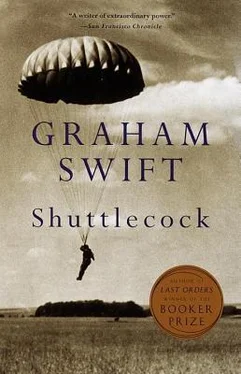Subject: Z, Arthur Leonard.
Born, June 12th, 1921; Hemfield, Nr East Grinstead, Sussex. Only son of Hon. Sir Geoffrey Robert, D.S.O., M.B.E., formerly Captain, Royal Hampshire Regt (born, Jan. 25th, 1894) and Katherine Elizabeth (née Phillips, born, Oct. 2nd, 1897).
Educ.: Oakwood Preparatory School, East Grinstead; Tonbridge School; Wadham College, Oxford (Law: 1937/8).
University career curtailed by outbreak of war. Joined R.A.F., 1940. Trained as fighter-pilot. Sqdns 80, 225; N. Africa, 1941–2. Grounded after accident in training exercise in which one flying officer killed and subject injured. R.A.F. Intelligence, London, 1942–5. 2 applications for retraining as pilot refused. Air Ministry, 1945–6.
Left R.A.F., 1946. Did not resume law studies (apparent cause of family dissension). Applied unsuccessfully, Foreign Office (subject spoke good French), 1947. Entered Home Office, 1947. Subsequent career of distinction. Married Yvette Simone (née Debreuil, born, May 10th, 1922; family from Chambéry, France) July, 1947. Resident at 19, Clifford Terrace, Kensington till 1950, then at 8, Peele Gardens, Putney (till suicide of subject).
Sir Geoffrey appointed K.C. 1938. Assisted at Nuremberg War Trials, 1945–6. Judge of the High Court of Justice, 1948. Chaired/Adv. Cttees. of Inquiry (Legal Rights of Prisoners; Aspects of International Law) 1959, 1960–61, 1962–3. Retired, 1964. Published: Sword and Pen (memoirs of military and legal career), 1965; Reasonable Doubt (critique of English jurisprudence), 1967.
Katherine Elizabeth victim of long and complicated illness from 1964. Operations for cancer. Died 1967.
Sir Geoffrey died 1968.
Richard Geoffrey, son of subject, born, July 22nd, 1949. Educ.: Westminster School, London School of Economics. Present occupation, journalist.
Elaine Elizabeth, daughter of subject, born, March 14th, 1951. Educ.: The Lodge High School, Putney; Camberwell School of Art. Formed liaison with Karl Lageröf, Swedish commercial artist, 1970. At present resident in Stockholm.
Only the details on Z so far. The information on X ‘in preparation and to follow’. Impossible, therefore, to look for connexions. So why do I linger over these potted facts? Is it because I have obtained them by my own initiative and ingenuity, proved how easy it is for one person, with neither the right nor the authority, to secure for himself the private history of another? Or is it that there is really something arresting, something appealing about these bare bones of a life (how many such skeletons have I cursorily pieced together at the department?) when it is you yourself who have scooped them up with your net? Those little tokens of dignity and esteem. The father’s military and civil honours. ‘ Sword and Pen ’. ‘Career of distinction’. Z cursed by an accident. The daughter running off with a Swede. ‘Family dissension’. Those place-names of imperturbable gentility: East Grinstead, Tonbridge, Peele Gardens, Putney. Suicide; war-crimes; ‘long and complicated illness’.
Or does something particular strike a chord? Debreuil? Wasn’t that the name of the firm of engineers with which Dad worked before the war, building embankments on the Rhône and road tunnels in the Savoy Alps — and where he learnt the fluent French he would put to use in the years to come? And Z’s Christian name: Arthur, Arthur … Why does that suddenly have an echo?
It is gone midnight. Marian is in bed. I sit in the living-room looking at these notes which I have smuggled home with me against all the rules, not even daring to look at them in the office. The window is open, an occasional breeze lifts the papers in front of me; and I remember Dad, sitting up late at Wimbledon, working on his book. Mother asleep in the big bedroom. Getting up once, in summer, to fetch a glass of water; pausing at the half-opened door, the desk lamp on inside, and seeing him suddenly start.
And now, when I turn to the other sheet — ‘Details of Subject’s Private Connexions outside the Home Office’ — which I have also requested, some last incidental entry makes the echo come loud and clear.
… Hon. Sec., The Putney Rotary.
Clubs: Oxford and Cambridge; Civil Service. Sports and Recreations: Golf. The Glade Golf Club, Wimbledon.
It is to the last two chapters of Shuttlecock that I return most frequently. It is not just that, even to the casual and disinterested reader, they must form the most exciting, the most dramatic pages of the book: Dad’s capture by the Gestapo; his imprisonment for eight days in the Château Martine, the Gestapo headquarters near the village of Combe-les-Dames; his escape; his flight through the forests of the Doubs valley; his awaking after a desperate night in hiding to discover, through the trees, not Germans, but advancing Americans, and his declaring himself (last, succinct scene of the book) to a Seventh Army lieutenant (‘a lawyer’s son from Connecticut, with impeccable politeness and a truck-load of canned meat’). No, it is not this air of grand denouement alone which compels me, but other qualities, more subtle, more tantalizing.…
For one thing, there are the gaps, the hazy areas in those eight days at the Château Martine. The Château is there all right, starting from the pages, its eighteenth-century elegance given over to twentieth-century brutality: the pitch-dark cells; the ornate staircases and passage-ways (on the way to interrogation sessions); the degrading musters in the courtyard; the smells, the rifleshots, the food (‘unspeakable swill’); the cries along corridors. Even the Château garden is there, for contrast (‘as unreal as some painting by Watteau or Claude’), glimpsed, again, through tall, casement windows, on those journeys to the interrogation room. But it is about the goings-on in that interrogation room, and other, sinister rooms, that Dad is silent, or circumspect. The picture clouds over: a few vague allusions, a hint of the inarticulable (‘Here description must be blurred’), a few chilly motifs.
All right, there are obvious reasons for this. The stress of circumstances which tested even Dad’s presence of mind, tenacity and powers of observation; which ten years later, late at night, in a room in Wimbledon, left gaping holes in the memory. Or the reverse? The memory not in the least impaired, still vivid-sharp; but the memory of something so terrible that it cannot be repeated, cannot be spoken or written of.
Did they torture you, Dad? Did they stretch you to the limit? And yet you write of things terrible enough — things which occurred only days before they dragged you out of that water tank and hauled you off to the Château — with relative composure.
… For with the German retreat through the eastern valleys the war entered a quite new, if, thankfully, brief-lived phase. Up to then we had lived in a world, superficially at least, at peace, disturbed and broken intermittently by incidents of violence, often savage it is true, but localized and in the majority of cases directly influenced by ourselves. With the waves of German troops, the tide of indiscriminate large-scale war, which had not been known for years, rolled into this corner of France. Not merely war on a large scale but war with all the desperation and last-reserve venom of an army in defeat. This was a period of burning villages, of corpses lining the streets and dangling from trees, of atrocities of all kinds. Whole areas of countryside which up till this time had seemed for us inviolable and friendly landmarks suddenly became ravaged, contaminated. Everywhere was the smell of blood, carnage, singed and rotting flesh.…
I have been trying to discover in these and other pages some clue to what happened in the Château Martine, some inkling of this experience beyond words. My own father tortured. Forced, perhaps, beyond the point of endurance. Why do I want to know this — like some interrogator myself? Because I will find out what Dad is really like?
Читать дальше












